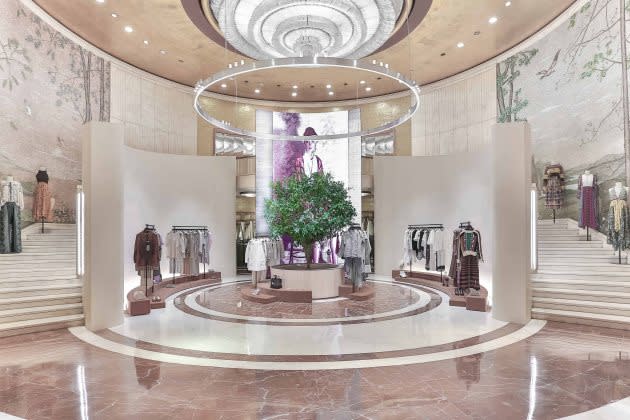Zara Parent Inditex Continues Climb

PARIS — Zara parent Inditex continued its meteoric post-pandemic growth.
The parent company of brands Massimo Dutti, Pull&Bear and Bershka reported a 24.5 percent jump in sales in the first half of 2022, while profits were up 41 percent. Gross margin was up 57.9 percent, marking the strongest first half in seven years.
More from WWD
Chief executive officer Oscar Garcia Maceiras credited four factors: “Our unique fashion proposition, an increasingly optimized shopping experience for our customers, our focus on sustainability and the talent and commitment of our people. Our business model is progressing at full pace and has great growth potential going forward.”
The company overcame inflationary headwinds with a boom in sales, which grew to 14.8 billion in the first six months of the year. Measured in constant currencies, sales were up 25 percent and rose in all geographical areas, despite price increases in the mid-single digits.
While cost-of-living increases are making headlines and impacting wallets, turnover at Inditex doesn’t seem to be slowing in the second half. The company reported store and online sales were up 11 percent year-on-year in constant currency between Aug. 1 and Sept. 11.
The pricing strategy should remain in place through the end of the year, Garcia Maceiras indicated.
“We try to have a stable pricing policy, but when there are temporary impacts coming from inflation in specific markets, what we do is try to adjust that,” he said in a call with analysts. “Very much we believe that the mid-single digit [increase] will be the same for the autumn-winter.”
Zara continues to be the strongest brand in Inditex’s mix. The fashion-fashion giant’s sales were up 29 percent as it continues to up its fashion game with a stronger offer of designer-inspired items, including its Night collection, with a much-publicized campaign starring Kate Moss.
Other stores in the group’s portfolio performed well, including the teen-skewing Pull&Bear and Bershka, which were up 19 percent and 15 percent respectively, and its higher-end Massimo Dutti banner, which was up 10 percent. Only Oysho, its lingerie and pajama brand, was down 4 percent as customers moved on from comfort dressing.
Net profit totaled 1.8 billion euros, while EBITA increased 30 percent to 4 billion euros. The company took a write-down of 216 million euros related to closing stores in Russia, where it had operated over 500 locations.
In the face of possible supply chain tensions entering into the second half of the year, Inditex accelerated the current-season inventory flow. Production was up 43 percent in the first half of the year.
“We’re talking about the long haul,” said Maceiras, discussing the increase. “This is why we have decided to temporarily anticipate the inflows to be well stocked into the autumn-winter season. This is absolutely the key part of our inventory right now.”
After a dip, online sales returned to the highs of 2021 and now amount to 30 percent of its sales mix. Maceiras said that the company’s new policy of charging for online returns had not affected sales, and in fact increased returns to stores where they could be introduced into the inventory and quickly resold.
Maceiras credited this omnichannel integration for much of Inditex’s growth, and said the company plans to continue fusing services and focusing on customer experience. Maceiras touted new upscale collections such as the collaboration with American designer Narciso Rodriguez, with pieces sitting well above Zara’s usual price point.
The company said it is renovating and improving Zara stores in several markets, including Portugal. Maceiras highlighted its upcoming opening in the Battersea Power Station shopping center in London in October, as it aims to position Zara as more of an upscale fashion brand and burnish its reputation.
Maceiras also touted the company’s sustainability credentials, as competitors such as H&M have been targeted by lawsuits and regulators in recent months. He said the group is “participating” in Virginia-based start-up Circ, which claims it can recycle cotton-polyester blends into cellulose to create lyocell or viscose, though it is still at the R&D stage and the technology is not to scale.
Inditex was part of a $30 million series B funding round back in July, led by Bill Gates’ Breakthrough Energy Ventures and textile manufacturer Milliken. Maceiras did not disclose Inditex’s level of investment.
Inditex operates 6,370 stores worldwide and opened new stores in 24 markets in the first half of the year.

